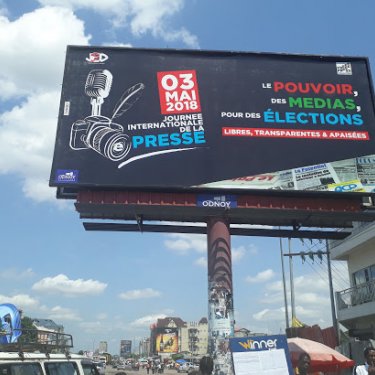DRC: Opposition media still closed just days ahead of presidential election

The continuing closure of five opposition media outlets in the Democratic Republic of Congo violates media pluralism and violates the 2016 political accord for holding a presidential election now due to take place at the end of this month, say Reporters Without Borders (RSF) and its local partner organization, Journalist in Danger (JED).
The five media outlets linked to President Joseph Kabila’s opponents were supposed to reopen under the so-called “New Year’s Eve Accord” that the government and opposition signed on 31 December 2016. Their reopening was one of the conditions for holding the long-awaited presidential election that was postponed yet again yesterday by the country’s electoral commission, this time from 23 to 30 December.
The still closed media outlets include Espoir, a radio station in the far-eastern province of Nord-Kivu owned by a parliamentarian allied with Vital Kamehre, who is opposition candidate Félix Tshisekedi’s campaign manager. It has been closed since April 2015. The other four are based in the southeastern Katanga region. One, Radio-Télévision Lubumbashi JUA (RTLJ), is owned by Jean-Claude Muyambo, a former Kabila ally now in prison. It was shut down in November 2014 for “failing to respect the legal provisions for privately-owned broadcasters” and for “inciting hatred and insurrection.” Two of the others, Nyota TV and Radio Télévision Mapendo, are owned by Moïse Katumbi, a former Katanga governor who fled the country and was prevented from returning to register as a presidential candidate. The fifth, La Voix du Katanga, is a radio station owned by a Katumbi ally.
“Only a handful of opposition media outlets were recently allowed to resume operating,” JED secretary-general Tshivis Tshivuadi said. “They include Radio Liberté Lisala, Radio Mwana Mboka and Radio Iriba FM. Aside from these limited concessions, we are concerned about the attempts to control online media outlets by means of a new regulation forcing them to register. We are also concerned about persistent rumours that the Internet and social networks could be disconnected on election day.”
Arnaud Froger, the head of RSF’s Africa desk, added: “In the run-up to this presidential election, one awaited for the past two years, the continuing closure of these five media outlets has violated media pluralism and limited debate during the election campaign. It also speaks to the climate of mistrust of a free, independent and pluralist press in the DRC.”
On 2 January 2017, two days after the “New Year’s Eve Accord,” the communication and media minister announced that “all the so-called opposition media that are closed will be reopened within two weeks” as part of the measures designed to defuse political tension envisaged in the accord. JED and RSF publicly criticized the failure to keep this undertaking in June of this year, and again in October, as political parties began preparing for the election campaign.
The DRC continues to be the country in sub-Saharan Africa where RSF registers the most press freedom violations. According to RSF’s tally, there have been a total of 96 violations of the rights of journalists and five arbitrary suspensions or closures of media outlets since the start of the year.
The Democratic Republic of Congo is ranked 154th out of 180 countries in RSF’s 2018 World Press Freedom Index.



